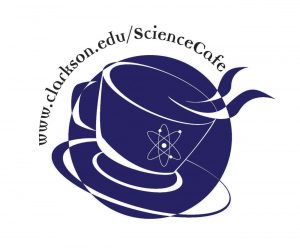University professors and scientists will once again take to the stage starting Sept. 18 for Clarkson University’s “Science Cafe.”
Science Cafes bring together local university and college professors and townspeople in relaxed, informal settings, such as coffeehouses and pubs. The speaker makes a short presentation about a topic in his or her field and then opens up the floor for discussion.
discussion.
All Canton Science Cafes will take place Tuesdays at 7:15 p.m. at the Best Western University Inn Rushton Room, 90 E. Main St. in Canton, N.Y.
All Potsdam Science Cafes will take place Wednesdays at 7:15 p.m. at the St. Lawrence Valley Roasters & Jernabi Coffeehouse, 11 Maple St. in Potsdam, N.Y.
Here’s a rundown of this fall’s topics and speakers:
Do You Have What It Takes to Become America’s Next Top Modeler?
Canton: Tuesday, Sept. 18
Potsdam: Wednesday, Sept. 19
From an early age, many students in math classes may think “why is this important?” It may come as a shock how extensively mathematics is used to build models that affect your daily life. From what Netflix thinks you’ll watch, to whether you are approved for a loan, or how an autonomous vehicle navigates, mathematical models guide decisions and predict aspects of the world around us. Join SUNY Canton Engineering Technology Lecturer Jesse Clark-Stone for an interactive evening of mathematical modeling, appropriate for all ages and math levels.
Sense of Space
Canton: Tuesday, Oct. 2
Potsdam: Wednesday, Oct. 3
Where are my keys? How far away is that stop sign? Do I turn right or left at the intersection? Our ability to answer these questions depends on our spatial reasoning skills – that is, how we visually perceive, remember, and navigate through space. Differences in sex, body size, topography, and expertise are among the factors that affect if people have a strong or weak “sense of space”. In this talk, St. Lawrence University Assistant Professor of Psychology Elyssa Twedt will summarize evidence of individual differences in spatial abilities and discuss ways in which spatial abilities can be improved or impaired.
How are Drugs Invented and Why is the Process So Expensive?
Canton: Tuesday, Oct. 23
Potsdam: Wednesday, Oct. 24
Natural materials (minerals, plants, and animals) were known to be useful in the treatment of illnesses from ancient times, but only with Paul Ehrlich’s development of the “magic bullet” concept, in the early 1900’s, did we realize that drugs could be invented, not only discovered. Science and technology led the way to the modern, rational drug design process, allowing the treatment of many diseases that were previously untreatable. But the road to a successfully marketed drug is still paved with many failures. Join Omar Stradella, associate scientific director of translational sciences at Sanofi S.A. (a French multinational pharmaceutical company), in a from-the-trenches discussion on the history of drug discovery and invention, the basics of modern drug design, and the economics of the process.
From Vision to Incision: Ophthalmological Insights from the Trenches
Canton: Tuesday, Nov. 6
Potsdam: Wednesday, Nov. 7
Vision is one of the most amazing of human abilities. In this event, Clarkson University Ph.D. student Yaroslav Filipov will discuss several aspects of human eye function, including basic principles of optics and vision, structure of the eye and nervous system, potential risks and aging conditions (cataracts, presbyopia), and common diseases (myopia, diabetes, glaucoma) and their treatment methods. The speaker is an experienced ophthalmological engineer, enthusiastic about his topic and eager to share his knowledge. All are welcome!
Global Temperature Targets: What are They Good for?
Canton: Tuesday, Nov. 27
Potsdam: Wednesday, Nov. 28
The 24th Conference of Parties (COP) to the United Nations Framework Convention on Climate Change (UNFCCC) will be held December 3-14, 2018, the week after this Science Café talk. The COP agenda includes a “Facilitative Dialogue” on the level and ambition to which each country has committed themselves in relation to keeping global warming below 2 degrees Celsius, this century. Join St. Lawrence University Associate Professor and Chair of Environmental Studies Jon Rosales as he discusses assessment reports by U.N. agencies, the level of ambition shown by the parties to the Paris Agreement, how important are temperature targets and the possibilities of avoiding dangerous climate change.